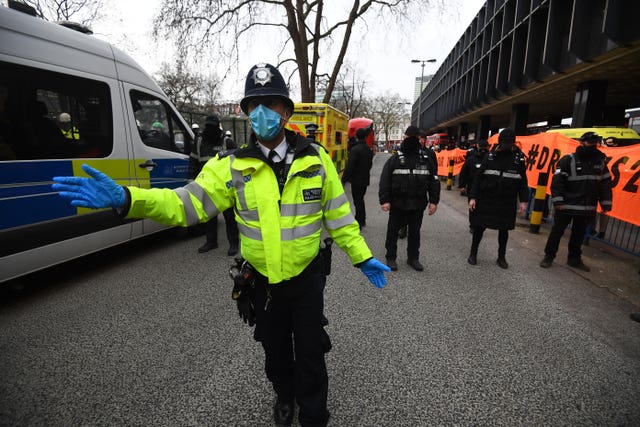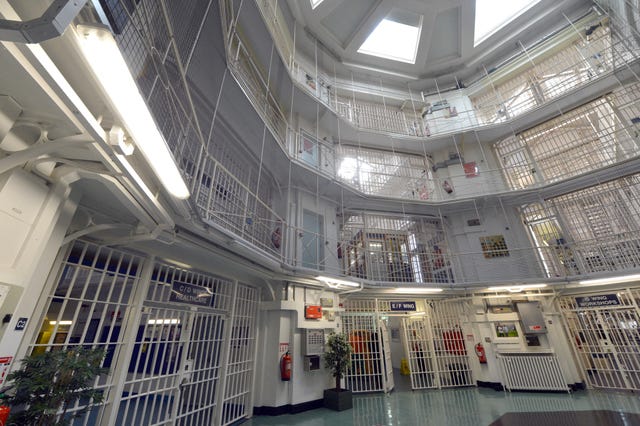“Rushed” legislation could pose a threat to free speech rights and make the job of officers policing protests harder, it has been claimed.
As part of efforts to overhaul the justice system, the Government is proposing a raft of measures in its Police, Crime, Sentencing and Courts Bill, which is due to receive its second reading in the House of Commons on Monday.
It includes plans to give police more powers to tackle non-violent protests which cause significant disruption to the public or on access to Parliament.
The proposed law includes an offence of “intentionally or recklessly causing public nuisance”.
According to the Bill, someone commits this crime if they cause “serious harm to the public”, which can include “serious annoyance, serious inconvenience or serious loss of amenity”. Those convicted could face a fine or jail.
The plans could also see police given powers to impose more conditions on static protests, like time and noise limits, and extend the rules to one-person demonstrations.
Police and legal figures have warned this could pose a threat to democracy.
Sir Peter Fahy, former Greater Manchester Police chief constable told Times Radio there was a “real danger” that rushed legislation could make the job of the police “more difficult”, adding: “People need to be really worried about this.”
He said: “If we’ve learned one thing this weekend, it’s the right to protest, the right to gather, the right to have a voice is fundamental to our democracy, and particularly British democracy.
“And bringing in legislation on the back of the Black Lives Matter and Extinction Rebellion demonstrations, rushing that legislation through, putting in some really dodgy definitions which the police are supposed to make sense of…

“Again, if we’ve learned one thing from the coronavirus legislation, (it) is that rushed legislation and unclear definitions cause huge confusion for the public and for the police having to enforce it.
“This weekend has shown the crucial importance of the right to protest, and you’ve got to be really wary of more legislation being rushed through just because certain politicians didn’t like certain protests during the summer.”
Human rights barrister Adam Wagner, of Doughty Street Chambers, warned the Bill could “hugely expand” police powers to “allow them to stop protests which would cause ‘serious unease’ and create criminal penalties for people who cause ‘serious annoyance’.”
He added: “This would effectively put the current situation where Covid regulations have given police too much power over our free speech rights on a permanent footing.”
The wide-ranging Bill includes plans to bring in tougher sentences for child killers and those who cause death on the roads, longer jail terms for serious violent and sexual offenders, and expand child sex abuse laws to ban religious leaders and sports coaches from having sex with 16- and 17-year-olds in their care.

The Bill could also see the maximum penalty for criminal damage of a memorial increased from three months to 10 years.
Policing minister Kit Malthouse told Sky News the Bill contains “huge protections for the public” and would put everyone “shoulder-to-shoulder on violence across the board”.
When asked about the plans to increase the maximum sentence for vandalising statues, he said criminal damage already carried a penalty of up to 10 years but was “limited” to shorter sentences for items with a value of less than £5,000.
He said this ignores the “emotional value or the symbolic value” of war memorials and other monuments so the Government was “just removing that anomaly”.
Discussing the right to protest, he said ministers were proposing “quite mild” changes to public order laws which have not been updated since the mid-1980s to remove “anomalies and loopholes” so conditions on marches and processions also apply to static protests.
He said this was “taking steps to protect the operation of our democracy” to stop those seeking to prevent others from attending court or voting in the House of Commons.
Protest and freedom of speech was “absolutely fundamental to our democracy” but has to be “balanced” against the rights of others and the operation of democracy, which is “even more vital”, he added.





Comments: Our rules
We want our comments to be a lively and valuable part of our community - a place where readers can debate and engage with the most important local issues. The ability to comment on our stories is a privilege, not a right, however, and that privilege may be withdrawn if it is abused or misused.
Please report any comments that break our rules.
Read the rules hereComments are closed on this article